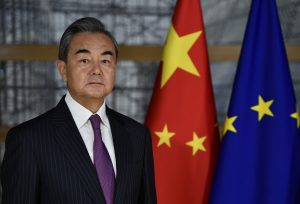One of the most notable developments in Asia-Europe relations amid the outbreak of the COVID-19 pandemic is the rise of Beijing’s overt and covert diplomatic offensive vis-à-vis Europe. In fact, China’s increasingly assertive and threatening approach – sometimes called the “wolf warrior” diplomacy – has alarmed many Europeans, and there seems to be an emerging consensus that Beijing’s behavior in the midst of the pandemic has been mostly counterproductive, leading to the notion that China is losing Europe.
However, it is still too early to make that call. The argument that China is losing Europe could give the false impression that Europe is winning. The battle has barely begun and it will be a long and hard one.
It is certainly clear that Beijing’s heavy-handed strategy of intimidation has alienated many Europeans and damaged China’s public image in Europe. The EU’s foreign policy chief Josep Borrell warns of a “global battle of narratives” regarding the pandemic and criticizes Beijing’s attempt to “play on” differences between Europeans.
It was widely reported in April that Beijing had tried to use its influence to change the wording of the EU’s report on disinformation activities. Though Brussels insists that it did not change any wording because of pressure from China, there is now official acknowledgment that Beijing did make a series of interventions.
Immediately following this, another controversy erupted. At stake was the censorship by the Chinese authorities regarding an op-ed piece for the China Daily, authored by the EU Ambassador to China and 27 ambassadors of EU member states in Beijing. The China Daily, under the supervision of the Chinese Foreign Ministry, wanted to deleted a sentence on the origin of the pandemic as a condition to publish the article. The fact that the EU Delegation accepted the censorship ignited fierce criticism back in Europe from those appalled at what it meant for press freedom. There have been other instances of China’s assertive behavior in various parts of Europe, most notably in France, where the Chinese Embassy website posted a series of articles by an anonymous Chinese diplomat criticizing the way France and Europe have handled the pandemic.
What the recent developments show is that Beijing has scored a series of own goals. What Beijing has tried to do – particularly its efforts to whitewash its image as the source of the pandemic and the intimidation it deploys to silence criticism of China abroad – have largely proved counterproductive. Europe’s policy discourse on China is undergoing a structural shift and what could be termed as “business as usual” approach toward Beijing is becoming harder to sustain. Europe has indeed changed a lot. Most recently, the situation in Hong Kong reinforces this trend.
However, it is crucial to remember that a mere series of Chinese missteps can never be enough on their own for China to “lose” Europe. Much depends on the European side as well. There are four main areas to take into consideration.
First, we need to recognize that Beijing’s goal is no longer about winning the hearts and minds of European people (if ever it was). China’s practical goal now seems to be to ensure that there are enough number of people in important positions in Brussels and in national capitals who are prepared to compromise European values, such as fundamental freedoms, and accommodate China’ positions for the sake of maintaining economic relations with China.
Second, the battle in Europe between those who are prepared to lose China and safeguard Europe’s values and interests on the one hand and those determined to preserve current relations with China on the other is set to intensify in the coming months and years, including after the pandemic. Beijing is already a substantial player working behind the scenes on national governments and business communities, trying to exert influence in its favor. In addition, countries such as Hungary and Greece, as well as the post-Brexit U.K., are beginning to become new battlegrounds between the U.S. and China.
Third, ridiculing Beijing’s diplomatic missteps will not make Europe more resilient to Chinese pressure. Beijing is fully aware of Europe’s dependence on China, based on which it formulates its behavior vis-à-vis different countries in Europe. Therefore, the question as to how each country could decrease its vulnerability to China is becoming more acute. The concept of “strategic autonomy,” which originally emerged in the context of foreign policy and security, now seems to be expanding to the issue of the global supply chain of strategically important products, including medical equipment, at least in the short term.
Fourth, one of the biggest questions facing us now is whether Beijing’s heavy-handed approach to Europe is a desperate short-term reaction in response to the pandemic, or if it is the beginning of a “new normal.” Even if assuming that Beijing’s approach could change, its interest and goals in Europe will not, meaning that in either case this is going to be a long battle.
Before claiming that China is losing Europe, there are many challenges that Europe needs to address. Beijing has certainly not given up on Europe.
Michito Tsuruoka is an associate professor at Keio University.

































